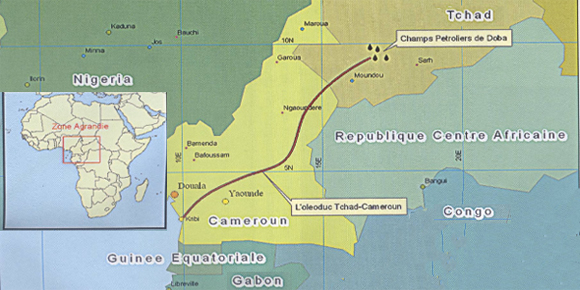- Washington “follows with interest” Morocco’s openness onto Africa (John Kerry)Posted 11 years ago
- The trial of South African Paralympic champion Oscar Pistorius opened in Pretoria on Monday.Posted 12 years ago
- USA welcomes efforts of King Mohammed VI in MaliPosted 12 years ago
- Egypt’s population reaches 94 millionPosted 12 years ago
- Mugabe celebrates his 90thPosted 12 years ago
- Moroccan Monarch to Build a Perinatal Clinic in BamakoPosted 12 years ago
- King Mohammed VI handed a donation of bovine semen for the benefit of Malian breeders.Posted 12 years ago
- Moroccan King’s strategic tour to Africa: Strengthening the will of pan African Solidarity and stimulating the south-south cooperation mechanisms over the continentPosted 12 years ago
- Senior al-Qaida leader killed in AlgeriaPosted 13 years ago
- Libya: The trial of former Prime Minister al-Baghdadi AliPosted 13 years ago
Chad / Cameroon: A consequent transit income
 “ Oil revenues continue to offer a magnificent windfall for countries that have this coveted resource but also the involved countries in the transit chain. The National Hydrocarbons Corporation (NHC), an oil company, has announced that Cameroon had, since 2003, endorsed “116 million US dollars of transit rights on the pipeline linking the Cameroon to Chad”
“ Oil revenues continue to offer a magnificent windfall for countries that have this coveted resource but also the involved countries in the transit chain. The National Hydrocarbons Corporation (NHC), an oil company, has announced that Cameroon had, since 2003, endorsed “116 million US dollars of transit rights on the pipeline linking the Cameroon to Chad”
Built between 2000 and 2003, the long pipeline (1070 kilometers) is connecting the oil fields of Kome, in south-western Chad, to the marine terminal at Kribi in Cameroon.
The Cameroon Oil Transportation Company (COTCO) has been paying, since 2003, a transit fee corresponding to the charges of the crossing pipeline in the Cameroonian territory. The National Hydrocarbons Corporation (NHC) has indicated that from the 1st of January to the 31st of October, 36.75 million barrels were transported through the Kome-Kribi terminal (KK1), against 35.53 million barrels for the same period of the previous year. These quantities exported to Cameroon have generated a transit fee of 15.5 million US dollars. However, the existence of this terminal is highly controversial. In July 2009, four NGOs from the U.S, Cameroon and Chad have estimated that the pipeline construction, between Chad and Cameroon, had depleted and totally damaged the local population interests, and that the measures taken by the World Bank had just changed a little to the matter. The U.S Environmental Defence, the Public Interest Law Firm (Chad), the fighting Network against hunger and the Environment & Development Centre (Cameroon) are attesting that the livelihood conditions and means of the populations have been permanently jeopardised in many places along the pipeline without “any effective consideration and compensation, they had said. Funded in part by the World Bank, the project had aimed in particular to reduce poverty in Chad, a country where over 80% of the population lives on less than a dollar a day. But in 2008, the bank had withdrawn from the project to protest against the violation of the N’Djamena agreements which was including provision of a portion of oil revenues “to future generations”. If Chad had won, in five years, more than 3.945 billion U.S dollars and increased oil wells in the south, it has deprived many communities of their fertile lands, thus accentuating rural poverty in this region, the NGOs stressed. In their view, the implementation of measures to limit the social and environmental impacts of the project remained very limited.
